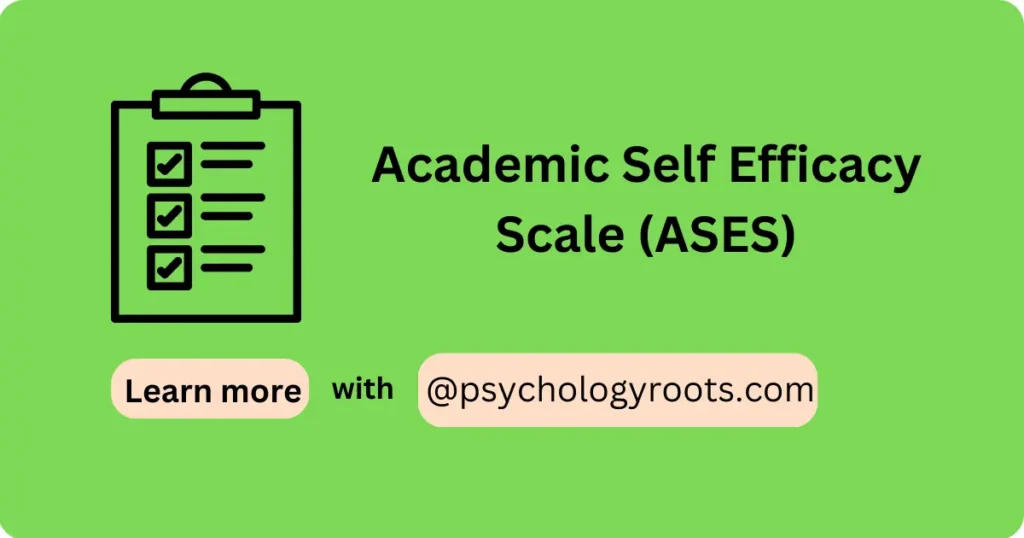Table of Contents
Academic Self-Efficacy Scale
Here in this post, we are sharing the “Academic Self-Efficacy Scale”. You can read psychometric and Author information. We have thousands of Scales and questionnaires in our collection (See Scales and Questionnaires). You can demand us any scale and questionnaires related to psychology through our community, and we will provide you with a short time. Keep visiting Psychology Roots.
About Academic Self-Efficacy Scale
Scale Name
Author Details
Muris, P. (p.muris@dep.unimaas.nl)
Translation Availability
English

Background/Description
The Academic Self-Efficacy Scale is a subscale developed by Muris (2001) to assess students’ confidence in their ability to manage academic challenges, control their learning processes, and succeed in educational settings. Academic self-efficacy is a crucial determinant of academic performance, influencing motivation, persistence, and coping strategies in response to educational challenges.
This scale is widely used for identifying students at risk of academic difficulties and for designing interventions to enhance their academic confidence. The scale is brief yet comprehensive, focusing on the specific dimensions of self-efficacy in academic contexts.
Administration, Scoring and Interpretation
- Target Population: Adolescents aged 14–18 years (Grades 8–12).
- Format: Self-report questionnaire.
- Instructions: Participants rate their confidence in managing academic tasks on a 5-point Likert scale ranging from 1 (Not Very Well) to 5 (Very Well).
- Duration: The scale typically takes 5–10 minutes to complete.
- Environment: A quiet and distraction-free setting is recommended for administration.
Reliability and Validity
- Reliability: The scale demonstrates excellent internal consistency, with a Cronbach’s alpha of .88.
- Validity: Evidence supports its construct validity, showing correlations with related constructs such as academic performance, motivation, and persistence.
Available Versions
08-Items
Reference
Muris, P. (2001). A brief questionnaire for measuring self-efficacy in youths. Journal of Psychopathology and Behavioral Assessment, 23(3), 145–149.
Important Link
Scale File:
Frequently Asked Questions
Q1: What is the purpose of the Academic Self-Efficacy Scale?
It measures students’ confidence in their ability to manage learning tasks and achieve academic success.
Q2: Who can use this scale?
The scale is designed for use by educators, school counselors, and researchers working with adolescents.
Q3: Can the scale identify students needing academic support?
Yes, it is a helpful tool for identifying students with low academic self-efficacy, which may indicate the need for additional academic or motivational support.
Q4: Are there any special permissions required to use the scale?
No permission is required for the use of this scale.
Q5: How can this scale be applied in practice?
The scale can be used to evaluate the effectiveness of academic interventions or as part of routine assessments in educational settings.
Disclaimer
Please note that Psychology Roots does not have the right to grant permission for the use of any psychological scales or assessments listed on its website. To use any scale or assessment, you must obtain permission directly from the author or translator of the tool. Psychology Roots provides information about various tools and their administration procedures, but it is your responsibility to obtain proper permissions before using any scale or assessment. If you need further information about an author’s contact details, please submit a query to the Psychology Roots team.
Help Us Improve This Article
Have you discovered an inaccuracy? We put out great effort to give accurate and scientifically trustworthy information to our readers. Please notify us if you discover any typographical or grammatical errors.
Make a comment. We acknowledge and appreciate your efforts.
Share With Us
If you have any scale or any material related to psychology kindly share it with us at psychologyroots@gmail.com. We help others on behalf of you.